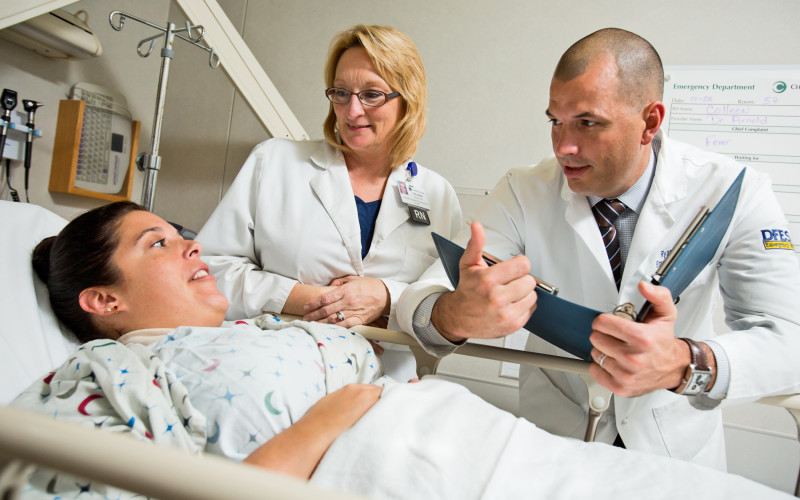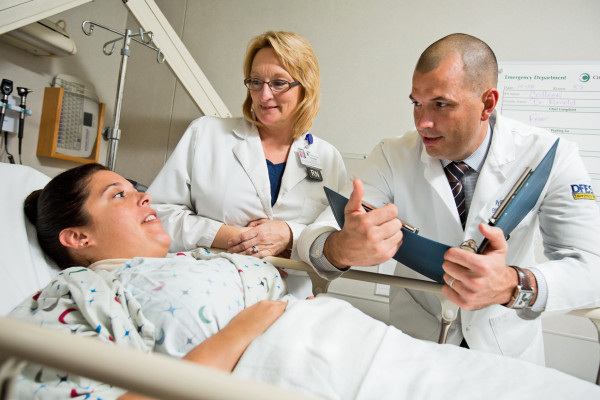CTR-ACCEL accelerates research in Delaware


Since 2013, the federally supported program Delaware CTR-ACCEL has advanced clinical and translational research identified as important to the health of Delawareans — cancer, obesity, rehabilitation, cardiovascular disease, stroke, women’s health and infant mortality.
ACCEL is accelerating Delaware research with a $20 million, five-year grant from the National Institutes of Health to Christiana Care Health System and three research partners: the University of Delaware, Nemours/A.I. duPont Hospital for Children and the Medical University of South Carolina. In addition, the state of Delaware is providing $5 million and the research partners are jointly contributing $3.3 million in matching funds.
Through ACCEL, clinicians and investigators with Christiana Care have won grants in each of the core research areas. Support includes:
- ACCEL Community-Engaged Research: This is a small-grants program for relatively new research teams to take their initial steps in community-based research. In December at the first ACCEL Community Engagement (ACE) Research Awards, researchers presented proposals pairing community members with investigators. At that time, two research proposals were approved for funding. One brings together staff from the Helen F. Graham Cancer Center & Research Institute, Cancer Support Community Delaware and the Department of Health & Behavioral Nutrition at the University of Delaware to study physical activity and impediments to sustaining activity among cancer survivors. The other, on smoking among disabled youth, is a collaboration of the Center for Drug and Health Studies and the Center for Disability Studies, both at the University of Delaware and the Delaware Division of Public Health, with educators, members of the disability community and public health practitioners.
- Mentored Research Development Awards: With these awards, scholars can spend at least 20 percent of their time during a six-month period on a research proposal, developing it with a sponsoring mentor. A recipient in Emergency Medicine is Ryan Arnold, M.D., MS, clinical investigator in Christiana Care’s Value Institute, who has received two of these grants to study the identification and management of sepsis infections.
- Pilot Project Grants: These provide application assistance to investigators with strong potential to receive future NIH funding and helps “pilot out” their idea for a year. For example, David Kahn, D.O., an investigator in neurology and neurological interventional surgery, will study electroencephalograms (EEG) in comatose patients, looking for measures that predict patients able to regain awareness following a coma.
- Big Data Pilot Grants: “Large data sets can be assembled and analyzed to look at everything from the value that comes from the mapping of genes to treatment outcomes in specific forms of care,” said William S. Weintraub, M.D., John H. Ammon Chair of Cardiology and the director of the Center for Outcomes Research at the Value Institute. One such grant has gone to Claudine Jurkovitz, M.D., MPH, senior physician scientist at the Center for Outcomes Research. Her goal is to acquire and study data on the delivery of care to Delaware patients with chronic kidney disease.
All these efforts build research infrastructure. Some studies involve Christiana Care clinicians with other Delaware partners, providing examples of collaborative research and community engagement, said Michael Rosenthal, M.D., chair of Family & Community Medicine at Christiana Care and ACCEL’s leader for community engagement and outreach.
“As we gather data on issues of concern for our communities, we will better assess what treatments are working well and where we need to look for new answers,” Dr. Rosenthal said.
A recently approved research pilot project led by Christiana Care and the University of Delaware will evaluate the effectiveness of Wise Guys, a community-based program aimed at preventing teen pregnancy by engaging young men as change agents. Delaware currently has the highest rate of unintended teen pregnancies in the nation. The program curriculum is used in school-based health centers, churches, fraternities and juvenile detention centers. A poster on the Wise Guys project won first place at the ACCEL conference in February.
Though Wise Guys has been running for almost eight years, there have not been measures to effectively judge its success. This research project, led by principal investigator Judith W. Herrman, Ph.D., RN, ANEF, FAAN, of the University of Delaware, aims to change that. Among the Christiana Care researchers collaborating on the project are Brian Rahmer, Ph.D., MS, research program director for Community Engagement and Health Services in Family and Community Medicine and a Value Institute scholar, and Christopher C. Moore, BA, LSSGB, senior program manager in the Center for Community Health, Department of Family and Community Medicine. Moore has been a key administrator of the Wise Guys program.
“ACCEL has provided the opportunity to take a long-time partnership and conduct a study to evaluate effectiveness,” said Moore.
The pilot grant supports incentives for teens to be part of a youth advisory group that will assist in designing new evaluation tools. These young men also participate in focus group discussions and innovative video journaling techniques that will help contribute to the relevance and significance of the evaluation for teens.
“This project is a strong model of partnership in research and represents the kind of community engagement that is so important,” Dr. Rosenthal said.